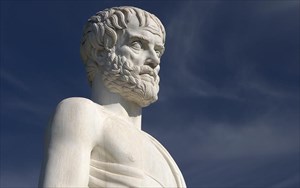Ancient Greeks are still considered significant part of the world’s "treasury" of ideas, according to a detailed analysis of European researchers in Wikipedia, the famous electronic encyclopedia in the world, visited by about 60% of the world’s population.
 Aristotle, Plato and Alexander the Great appear in two separate top-ten rankings of the individuals with greatest global influence. At the top of both rankings (which differ in their ranking methods), one would be surprised to find the Swedish biologist Carl Linnaeus and Adolf Hitler.
Aristotle, Plato and Alexander the Great appear in two separate top-ten rankings of the individuals with greatest global influence. At the top of both rankings (which differ in their ranking methods), one would be surprised to find the Swedish biologist Carl Linnaeus and Adolf Hitler.
Researchers from France, Italy and Spain rank individuals based on the links appearing in about 31 million articles in Wikipedia which has 287 editions in different languages and which is considered the largest repository of world knowledge.
Scientists describe Wikipedia as a network of Wikipedia articles. The more the links in the network to an article, the greater the influence of the person’s name to which the article is dedicated. The number of these links is described by means of the PageRank algorithm created by Google, which method is used to make the first global ranking.
The second ranking in regard to global influence is based on the use of another algorithm called 2Drank, counting both the inbound links (i.e., quotes of other pages to a specific web page dedicated to a particular person) and the outbound ones (i.e. quotes to other pages from a web page dedicated to a specific person).
The First Top-Ten Ranking.
The first top-ten ranking (based on PageRank) comprises Carl Linnaeus, Jesus Christ (who was first in 2010), Aristotle (third place), Napoleon, Hitler, Julius Caesar, Plato (seventh), Shakespeare, Einstein and Queen Elizabeth II.
What should be noted is the global presence of both Aristotle and Plato, who were included in the top hundred (Top 100) editions of Wikipedia in the 24 major languages of the world. Moreover, by achieving a score of 2237 points, Aristotle is very close to the top (the first one, Carl Linnaeus scores 2284, the second in rank, Jesus Christ, scores 2282 as the fourth one Napoleon, reaches 2208 points). In the English version of Wikipedia, Aristotle occupies seventh position regarding influence, which means he has an even greater impact in non-English-language pages.
Second Top-Ten Ranking
The second top-ten ranking (based on 2DRank) comprises: Hitler, Michael Jackson, Jesus Christ, Beethoven, Mozart, Pope Benedict, Alexander (eighth position), Darwin and Barack Obama. Alexander scores 789 points against 1537 for Hitler and his name is at the forefront of 11 of the 24 editions of Wikipedia.
Greek Wikipedia
In the Greek edition of the electronic encyclopedia, the most important person in terms of being cited by others (PageRank) is Alexander the Great. The top-ten also includes Jesus Christ, Aristotle, Herodotus, Plato, Napoleon, Strabo, Pausanias, Hitler and Linnaeus.
As far as persons related to Greek contemporary political life and history are concerned, the ranking includes King Othon (12), Ioannis Capodistrias (17), Theodoros Kolokotronis (19), Eleftherios Venizelos (24), Andreas Papandreou (39), Konstantinos Karamanlis (56), Ioannis Metaxas (57) Georgios Papandreou (83) Charilaos Tricoupis (89).
Plato ranks first in the second 2DRank ranking, followed by Alexander the Great, Eleftherios Venizelos, Emperor Augustus, Beethoven, Andreas Papandreou, Ioannis Capodistrias, Plutarch, Constantine the Great and Hitler.